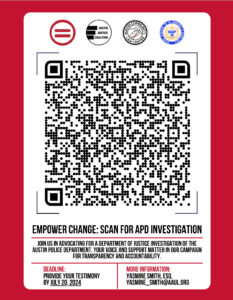Help the DOJ to investigate civil rights violations at the Austin Police Department
In February 2024 several community and legal service organizations (Austin NAACP, Austin Justice Coalition, Equity Action, Austin Area Urban League, Texas ACLU and the Austin Community Law Center) requested a Department of Justice (DOJ) investigation into the Austin Police Department.
But the DOJ is more interested in you and YOUR experience. The Department of Justice will investigate the Austin Police Department if the recent experiences of those who live here indicate a pattern of injustice. If you have something you want to say to the DOJ, we’ll help you get your message through even if you wish to remain anonymous. If you were recently arrested or ticketed, and something happened in that process that you think violated your rights, we are here to hear! Use this QR code to get started!!

Austin has a long history of unnecessarily aggressive and unlawful policing; leadership who will check a lot of reform boxes — “appearing to do just enough to suggest progress” [Kroll, 2/20/24, p. 8] — while resisting actual change; a toxic culture that reinforces fear, hostility, and harmful stereotypes of communities police are supposed to serve — including people who are Black, Brown, experiencing homelessness, have a disability, and other vulnerable communities; and a culture of impunity.
If you have a personal story illustrating problems with the police department, its leadership or individual officers, the DOJ needs to hear from you. Use this link or the QR code above to start the process. We will be setting up meetings where you can tell your story in person, or use this web form! https://speak4.app/lp/f2bfed/?ts=1712166020
The harms of Austin’s police practices are borne disproportionately by Black people, and there is evidence this is due in part to intentional discrimination on the basis of race. In collaboration with our elected City Council, the community has made numerous unsuccessful efforts over several years to reform these deeply-embedded constitutional deficiencies in the Austin Police Department. These problems are at the root of recent requests for you to investigate the excessive force Austin police inflicted on peaceful demonstrators during 2020 demonstrations against police violence.
The impunity that certain officers enjoy in Austin is highlighted by recent turns in the ongoing prosecution of officers who seriously injured community members exercising their constitutional right to protest in May of 2020. These protests themselves were against police brutality. The Austin Police Department’s response to these protests was exceptionally brutal. In numerous incidents over several days, police indiscriminately fired hundreds of lead shot pouches from shotguns into crowds, and tear gas into crowds of demonstrators, and beat many with batons, inflicting serious injuries. Austin Police Department’s actions caused intracranial hemorrhages, skull and facial fractures, lacerations, bruises, and ammunition to be stuck in peoples’ bodies.
Years after the protests, we learned that command-level staff within the Police Department knew in advance of deploying officers with 12-gauge munitions that those munitions had caused serious bodily injury before and could do so again.4 Troublingly, Austin delayed disclosure to prosecutors about this knowledge until after the statute of limitations to file criminal charges against officers for their actions during the protests had passed. The department’s disturbing behavior during the 2020 protests is simply the latest unlawful conduct that violates residents’ constitutional rights.
For instance, despite paying out over $20 million in settlements to victims of police brutality during the 2020 protests, the City of Austin has not disciplined officers, including those indicted by a grand jury, for their conduct during those protests. Nor has the department issued discipline over the more than 100 examples of false arrest and excessive force cited by Kroll in 2022 after an audit of body camera video. After voters approved a ballot measure to address the lack of accountability, the City of Austin refused to implement it and is now fighting it in court.